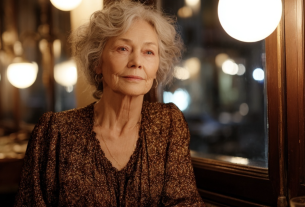Chapter 1. A Monologue of the Sky
The sky over the city darkened in a matter of moments, as if someone above had decided to draw heavy, leaden curtains across the last rays of the departing day. The air, only recently filled with the scents of asphalt and a distant blooming park, grew thick and damp, foretelling inevitable foul weather. And it came—not quiet and pensive, but furious—crashing down on avenues and alleys in a solid wall of water that made shop windows shudder under countless blows. It felt as though nature itself had set about a great washing, eager to rinse the city of its accumulated weariness, disappointments, and the sadness of its inhabitants.
Pressing close to the curb, Artem cut the engine of his not-so-young car. Silence settled in the cabin, broken only by the steady drumming of drops on the roof and the lulling whisper of the wipers, stilled now in mute expectation. It smelled of old faux leather, the tart coffee from his thermos, and damp fur—the traces of yesterday’s passenger and his large, restless dog. He looked into the rearview mirror at his reflection—tired eyes, the faint webbing of lines at his temples betraying nights without proper rest and days filled with monotonous bustle.
In recent years his life had felt like running in circles: early wake-ups, endless delivery orders, and, now and then, a side job as an unofficial cabbie for acquaintances or for those lonely figures at raw, windswept bus stops who stirred a quiet tug in his chest. He could never just drive past; his heart, despite all reasoning, remained soft.
It was precisely that soft, responsive place inside him that made him notice her that day.
She stood under a small umbrella—clearly unequal to the downpour—at a bus stop in the very heart of the city, at the crossroads where Prospekt Mira met Osennyaya Street. Water streamed in sheeted rivulets off the battered canopy, forming a fragile watery palisade around her.
Her figure seemed delicate and defenseless. Gray hair gathered into a neat yet rain-soaked bun. Glasses in an old-fashioned frame, behind which a deep, attentive gaze hid. A coat that had once been sturdy and warm, now worn at the bends, carried the memory of many winters. In her hands, pressed to her chest, she held an old imitation-leather handbag; from the half-open flap peeked the familiar corner of a yellow medical card.
She watched the stream of cars with such mute entreaty, with such quiet, almost desperate hope, that every vehicle sweeping past seemed to take a small measure of warmth from her. She didn’t lift her hand, didn’t try to flag anyone down; she simply stood and watched, as though waiting for the universe itself to send her a sign.
Artem felt a hitch in his chest. The day had been difficult already—several orders canceled at the last minute, a long line at the gas station, and at home a pile of envelopes lay on the table with numbers that offered no comfort. Weariness weighed on his shoulders like lead. But he could not leave her there, alone, under that raging sky.
He eased forward, pulled up, and lowered the window, offering his face to the spray leaping from the asphalt.
“Are you going far?” he called, raising his voice over the roar of the rain.
The woman approached slowly, hesitantly, holding her bag as if it were the most precious treasure in her life.
“To Ozyorny Lane, if that’s possible…” she said in a quiet but surprisingly clear voice. “Near the old clinic.”
“Please, get in,” Artem nodded. “I’ll take you. Don’t worry.”
She froze for a moment, her look showing a flicker of disbelief.
“You… mean it?”
“Of course. In weather like this, you wouldn’t wish a bus wait even on an enemy. It’s right on my way.”
Careful, as if afraid of disturbing the car’s invisible household spirits, she settled into the passenger seat, set the bag on her knees, and thanked him softly, almost in a whisper. Artem didn’t ask needless questions; he sensed this woman carried within her an entire world of quiet sorrow, a world into which outsiders should not intrude.
He switched the wipers back on, and they began to mark the tempo of their wordless journey through the watery veil like a metronome. The city beyond the glass dissolved into gray-blue smears; the lights of streetlamps and neon signs turned to ghostly gleams.
Only when the navigator showed an imminent turn toward Ozyorny Lane did she gently break the silence.
“Do you… have a family?”
The question was so unexpected that Artem nearly smiled.
“No. Why do you ask?”
“It’s just… you remind me of my boy. Only he…” her voice trembled, and she turned toward the fogged window. “He hasn’t come by to see me in a long time.”
Artem found nothing to say. He merely nodded, focusing on the road, and soon stopped by a modest three-story building whose façade bore the marks of time.
“Thank you, young man,” she said as she stepped out and opened her unhelpful umbrella once more. “You are very kind. People like you are rare these days.”
His face lit with a warm, genuine smile.
“All the best to you.”
She nodded in return and disappeared into the stairwell’s darkness. For a few more seconds the cabin held a faint, elusive trail of lavender and something medicinally bitter.
It never occurred to Artem to ask her name.
Chapter 2. A Message from Another Time
Days folded into weeks and flowed on. Artem’s life returned to its familiar course: delivery routes, night shifts, brief calls with his mother, who, with enviable regularity, would ask, “So when are you finally going to settle down and find a good partner?” He deflected with jokes, saying he hadn’t met “the one” yet, but inside he felt a growing emptiness—a quiet longing for something real, something solid.
At thirty-two he could boast neither a strong family base nor a place of his own, nor even a clear goal—except for one almost fantastical dream: to open, someday, a small, cozy café where the air would smell of fresh pastries and ground coffee, and people would come not just to grab a bite but to rest their souls.
Then, in his mailbox—crammed with ads and bills—there appeared an unusual letter. Not an email you could erase with a click, but a real one, on heavy paper, embossed with a waffle-textured seal and strict stamps. The envelope was from a notary office.
With mild bewilderment mixed with unease, he opened it. Inside lay an official document—notice of the opening of an estate.
“Citizen Artem Sergeyevich Belov… on the basis of the last will of the deceased… becomes the heir…”
He read the lines several times. The words wouldn’t sit in his head; they felt like visitors from a parallel reality.
The deceased—Vera Nikolayevna Orlova. The very same woman from the bus stop.
She had bequeathed to him her apartment on 12 Ozyorny Lane, as well as funds in a bank account totaling—no more, no less—2,300,000 rubles.
Artem sank into the nearest chair, unable to tear his eyes from the white sheet with its dry legalese. What was this? A tasteless joke? A prank by colleagues? Or had he unwittingly become part of a staged show, hidden cameras recording his reaction?
But it was all true, confirmed by a serious man in a strict suit behind a massive oak desk at the notary’s. Vera Nikolayevna had drawn up her will a few days before her passing.
She had no relatives left—her son had died in a traffic accident many years earlier, and her husband had preceded him in death. All the paperwork was impeccable. Artem was the sole heir.
“But why me?” he asked the notary, still unable to believe what was happening.
“There’s a note in the will from Vera Nikolayevna herself,” the man replied, adjusting his glasses. “She wrote: ‘This man gave me a ride in a torrential downpour, not knowing who I was or what I owned. That act was the last selfless kindness I witnessed in my life.’”
Artem stepped outside into a sun that had broken through after recent rains and stabbed at his eyes. He stood on the sidewalk, stunned. His thoughts tangled: a flat in a good neighborhood—that was a fairy tale, a dream. But guilt and incomprehension gnawed at him. Why had she chosen him? He was only a chance helper on a rainy day…
Chapter 3. A Secret Hidden in an Old Chest
Moving into the new apartment took Artem a few days. He didn’t rush to sell the unexpected inheritance—first, he wanted to understand what this place was, what life had unfolded within these walls.
He sorted things slowly, treating every little item that had belonged to Vera Nikolayevna with care. In the wardrobe he found an old photo album. On the yellowed pages moments of happiness were frozen: a young, smiling Vera with a tall, stately man; then Vera again, now with a little boy gazing at his mother with love. The eyes in those photos shone with joy and hope.
But nearer the end of the album, the pictures changed. The last photographs were of solitude: Vera Nikolayevna by a window with a book; in the kitchen with a cup of tea; in an armchair with a fluffy cat on her lap. And in her gaze there was a quiet, habitual sadness.
In the bottom drawer of an old chest of drawers smelling of mothballs and dried herbs lay a notebook in a simple cardboard cover. Artem opened it with a tremor, aware he was intruding on someone’s private life yet unable to resist the urge to learn the truth.
“Today the bank called again. They spoke insistently about some debt on a loan. But I never took out loans! I don’t even know what account they mean… Where could it have come from?”
“If my son were here, he would never let them intimidate me. He always stood up for me—my defender…”
“They claim I signed all the papers myself. But I don’t remember that at all. That day my head was very bad—everything was swimming before my eyes…”
Artem frowned, rage beginning to simmer in his chest. What loan? Who could have made her put her signature on unfamiliar documents?
He began his own investigation. He contacted the bank and requested detailed account statements. The picture came into focus: a large loan had been taken out in her name several months before her death, secured by the very apartment. The entire sum was transferred immediately to an entity with the grand name LLC “Finance-Optima.” As Artem soon learned, the company was registered to a front person and conducted no real business. Yet the loan contract bore Vera Nikolayevna’s sweeping signature.
He took a copy of the agreement to a handwriting expert he knew. After studying it, the expert only spread his hands.
“It’s not her hand. Too carefully done, but without her characteristic pressure and natural flow. Most likely, a skillful forgery made with modern techniques.”
Then the full depth of the tragedy dawned on Artem. She had been deceived. They had exploited her weakness, her loneliness—perhaps even her health. It was quite possible that it was this blow, this betrayal, that stole her last strength—not age or illness.
He filed a police report. A week later, a summons arrived—but not as a witness. As a defendant.
Chapter 4. Battle in the Courtroom
The plaintiff was that very “Finance-Optima.” Their demands were simple and cynical: Artem, as heir, must repay Vera Nikolayevna’s debt of 2.1 million rubles, including all accrued interest and penalties.
By the letter of the law, their logic was ironclad: accept the inheritance—accept the debts.
“But this debt was illegal from the outset!” Artem protested at the very first hearing, his voice trembling with indignation. “The signature was forged! She was misled—she wasn’t capable of understanding her actions!”
“Do you have irrefutable proof?” the judge asked coolly without lifting his eyes from the papers.
The plaintiff’s representative—a young man in a flawlessly tailored suit with an expensive watch on his wrist—smiled condescendingly. He saw before him a simple driver with no money for a good attorney, no connections—one man against a well-oiled machine.
But Artem had no intention of surrendering. A stubborn resolve stirred within him that he hadn’t known he possessed.
He became the archivist of his own defense. He gathered everything: official statements from medical institutions about Vera Nikolayevna’s condition, written testimonies from neighbors affirming her confusion during those days, footage from the building’s surveillance camera proving that on the day the loan was supposedly issued she was not at home—she was inpatient at the hospital. He found and brought in her neurologist, who provided a professional opinion on her state.
He even tracked down a former employee of the firm— a woman who, under a promise of anonymity, agreed to give a written statement: “We were tasked with getting elderly people to sign documents by any means. It didn’t matter whether they understood anything. The only thing that mattered was having the paper executed.”
The story began to catch journalists’ attention. Local papers ran headlines like: “Inheritance or Shackles: How Kindness Turned into a Court Case.” On social media, concerned people started to collect funds for Artem’s legal aid. A lawyer stepped forward—young but principled—agreeing to take the case pro bono.
But the most unexpected twist awaited him at the third hearing.
The courtroom door opened and in walked a woman of about forty-five. She was dressed with strict elegance, her face composed in cool confidence. She approached the bench and declared, crisp and clear:
“I am the daughter of Vera Nikolayevna Orlova. And I demand that the will made in favor of the defendant be declared invalid.”
Artem’s breath caught. He felt the floor drop away beneath him.
“What daughter?” he whispered. “She told me only about a son… only him…”
“My biological mother abandoned me at the maternity hospital,” the woman’s voice rang with metallic precision. “But I found her through a modern DNA test. I am her flesh and blood. Therefore I am the lawful heir by right of kinship.”
The judge demanded the necessary documents. She had them: a birth certificate, genetic test results, even an old, yellowed letter, supposedly written by Vera Nikolayevna many years ago, in which she asked forgiveness for what she had done.
Now Artem risked not only losing the unexpected inheritance but also being left alone to face a huge, unjust debt.
Chapter 5. The Dust of Archives and the Clarity of Truth
Artem spent the night after that hearing without sleep. He reread Vera Nikolayevna’s diary again and again, scrutinizing every line, every comma. His eye fell on a page he had somehow skipped before.
“Today that same young woman came again. She insists she is my daughter. But I cannot remember… I cannot. At the hospital they told me clearly—the baby, a girl, was stillborn. I wept over her tiny grave for weeks. And now this stranger with hard, alien eyes comes demanding that I acknowledge her. I am afraid. She keeps asking about the apartment, about documents. Speaks of ‘restoring justice.’ But there is not a drop of warmth in her words. Only calculating greed.”
Artem understood everything. This woman wasn’t looking for a mother. She was looking for an inheritance. Like a carrion bird, she had scented easy prey in a lonely, ailing old woman.
He hired a private investigator—through that volunteer attorney—who dug to the roots in a matter of days. The truth proved bitter and tangled: the baby had indeed been born, but Vera Nikolayevna had undergone a harrowing delivery with complications, hovering between life and death. Her husband, unable to bear the grief and terrified of losing his wife, made a terrible, rash decision—he hid the truth, telling Vera that the child had not survived. He didn’t want his sick wife to know that their daughter lived but had been placed in an orphanage because he couldn’t raise her alone. He died of a heart attack a few years later, never revealing the awful secret.
Worst of all, the “daughter” knew this story. She knew and deliberately filed suit to seize the apartment, without a shred of remorse.
Artem gathered the new evidence into an unbreakable chain. He brought a key witness to court—a retired nurse from that very maternity hospital—who, at considerable personal risk, testified on the record: the baby had been alive, and the mother knew nothing of her fate because of the father’s actions.
The judge, having heard all sides, called a recess to reach a final decision.
At the next session, the verdict was read. The room held its breath.
The loan agreement was declared void—expert analysis confirmed a forged signature, and medical reports established that Vera Nikolayevna lacked capacity at the time of signing.
The will was upheld as lawful and reflective of the deceased’s last will—there was irrefutable evidence that she was clear-minded on the day it was drawn and consciously chose her heir.
The suit of the woman claiming to be the daughter was dismissed—the court found she had presented no proof of real care for her mother or of maintaining any relationship with her during her lifetime.
Artem stepped out of the courthouse, his knees weak—not from frailty but from the colossal strain on his nerves. He had won. He had defended his truth and the good name of Vera Nikolayevna.
But there was no elation inside him—only a deep, piercing sorrow for the lonely life that had led him to this day.
Chapter 6. The Echo of a Rainy Day
A month later Artem made his decision. He sold the apartment on Ozyorny Lane. Not out of greed or an unwillingness to live there. He simply realized: that house had never been his. It was the last materialized hope of a solitary soul who, departing, wished to leave her faith in human kindness in reliable hands.
He divided all the proceeds into two equal parts. The first became the financial foundation of his long-held dream—a small but cozy café. The second he directed toward creating and registering a charitable foundation devoted to helping lonely elderly people in difficult circumstances. He gave the fund a simple, luminous name—“Vera,” which in Russian also means “faith.”
On the very day his café, “Morning Carriage,” opened its doors for the first time, he noticed an elderly woman at the nearest bus stop. She stood tapping a folded umbrella against the asphalt, searching for something in her bag, clearly chilled by the cutting wind.
“Need a hand? Where are you headed?” Artem asked, walking toward her.
She lifted kindly, slightly weary eyes and smiled.
“Oh, I’m not in any rush… Just going home from the clinic.”
“Allow me to give you a lift,” he said. “Free of charge—that’s standard practice for my place.”
With mild surprise she agreed and got into his car. Artem turned the heater up, and warm air began slowly to fill the cabin.
He no longer waited for, or expected, any reward for kindness. But now he knew for certain: even the smallest, seemingly insignificant act can be that very beam that lights someone’s darkest night. And that light, reflected from other hearts, will return to you, multiplied in strength.
Epilogue
A year passed. His café, “Morning Carriage,” had become a place where people came not only for a cup of aromatic coffee but for a heartfelt conversation, for a minute of peace. On one wall, in a handsome wooden frame, hung a portrait of Vera Nikolayevna—the happy one, with her young son. Beneath it a plaque was engraved: “Kindness is not a spontaneous impulse. It is the deliberate choice of a strong person.”
From time to time short notices appeared in the local paper: “Café Owner Helps Elderly Couple Avoid Losing Their Home,” “Holiday Dinner for Lonely Pensioners Held at ‘Morning Carriage.’”
Standing behind the counter, listening to the steady hum of voices and the scents of fresh pastries and beans, Artem no longer felt that old, oppressive emptiness inside. His life had found purpose and fullness.
He now understood with absolute clarity: his real life hadn’t begun on the day he received the envelope from the notary. It had begun much earlier.
On that very rainy day when, tired and a little irritable, he still pulled over by the old bus stop at the corner of Prospekt Mira and Osennyaya Street.



